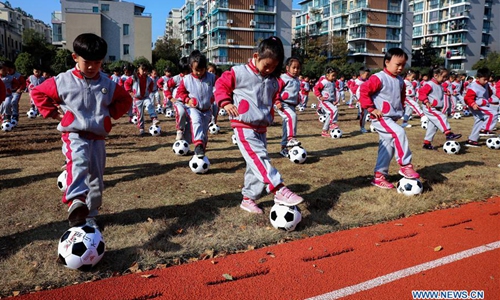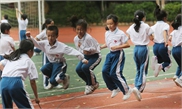
Students perform with footballs during a football themed activity at a kindergarten in Changxing County of east China's Zhejiang Province, Dec. 9, 2019. (Xinhua/Xu Yu)
A Chinese lawmaker proposed that schools should push "gender-differential" education for students to "make boys more like boys and girls more like girls," fueling the fire that is still raging amid the controversy caused by the recent education suggestion that political advisors made to boost the "masculinity" of boys.
Xiong Sidong, principal of Suzhou University and also a deputy at the 13th National People's Congress (NPC) told the media that he would put forward the proposal during the national two sessions, China's main annual legislative meetings.
Xiong pointed out in the proposal that many boys in China show the temperament characteristics contrary to the traditional "manhood", such as being timid, quiet, dependent and lacking adventurous spirit, which has "led to social and family concerns."
He suggested that schools should set up more "gender-differential" courses to guide students to better understand their biological sex and social gender and have a "natural and healthy" gender aesthetic concept. For example, the school should encourage boys to do more competitive sports such as football and basketball and girls to take part in rhythmic gymnastics, yoga and other exercises conducive to enhancing flexibility.
Xiong's proposal came after a political advisor made a controversial suggestion that school hire more male teachers to promote the "sex-balance" on the campus ahead of the two sessions.
As the topic of boosting the "masculinity" of boys has been under heated discussion on Chinese social media, the proposal once again aggravated the backlash of netizens who think such proposals will lead to gender stereotyping and cause problems for kids as well as the society.
Xiong Bingqi, director of the 21st Century Education Research Institute in Beijing, made a poignant statement that opposes the NPC deputy to amplify the gender differences in making educational plans for students in Chinese schools.
"The 'masculinity', of having well-built body figure, determination, should be equally important to girls but not just boy," Xiong told the Global Times on Thursday, rejecting the assumption in the proposal that only male students are entitled to have the characteristics defined as "masculine."
Instead of "guiding" the students to become the way they "should be," schools should try provide more space for the students to explore themselves and make their own decision on what they want to be, he said, saying that schools can establish more diversified themed clubs or courses to accommodate students' different potentials and let them find out what they are good at or passionate about.
"It is a matter of a student's talent and interest, not his or her gender," he said.

